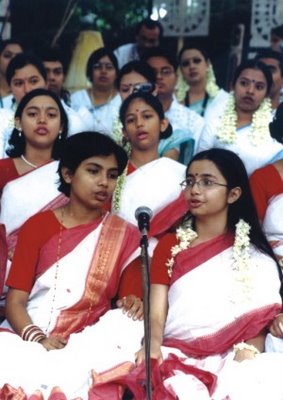Saturday, April 15, 2006
Bangla New Year: Our glorious legacy and heritage

Every year on the 14th of April we celebrate Pahela Baishakh, Bangla New year's day. Pahela Boishakh is an occasion for joy and merrymaking for Bengalis. The celebration of Bangla Naba Barsha is a unique one and it touches the lives of all, the rich, the poor, the young and the old.
Although the English New Year and the Bangla Naba Barsha are regularly celebrated all over the country each year, they are indeed different in their qualitative and quantitative aspects. While the Bangla Naba Barsha is celebrated through the length and breadth of the country, the New Year's celebrations are city based, restricted to the urban areas. On the other hand, the Bangla Naba Barsha celebrations begin with simple folks living in our villages spread all over the country.
Bangla Naba Barsha celebrations are multifaceted and represent in a simplistic way our lives and living. The celebrations depict the richness of our culture from food to music to literature. Dancing, singing, holding poetry sessions, street theaters and jatras happen to be some of the regular features of the celebrations adding to the overall colour and diversity of the festivities. Unique also is the tradition of opening of the Hal Khatas, ushering in new business hopes and giving a fresh impetus to honest earning for a living.
One of the main features of the Bangle Naba Barsha celebrations is holding of the Baishakhi Melas (mini fairs of indigenous merchandise including homemade handicrafts) held over the country which often begin well ahead of the New Years day and often lasts days after. These fairs are unique, the merchandise in display are often traditional food items, rural handicrafts made in individual households. The displays in these melas are veritable representations of our rich culture through the ages.
So intense is the appeal of these melas that Brick Lane “Bangla Town”, one of London's most vibrant quarters, has taken the tradition outside of Bangladesh this year and has already set up the Brick Lane Mela 2006 as part of the Bangla Naba Barsha celebrations . This mela has turned out to be an window to exposing and bringing the multicultural aspects and essence of Bangla culture to the people of UK and beyond.
Bangla Naba Barsha celebrations also include events like the Nauka Baich (rowing), Lathi Khela (stick fight), Kite flying so on and so forth. There is simply more to Bangla Naba Barsha than the eye can meet. One of the most significant aspects of the celebrations of the day has been its “secular characteristics”. The celebrations has the tradition of taking into its fold people of all religious faiths, the Hindus, the Christians and others who are a part and parcel of our nation. Bangla Naba Barsha over the years has acted as the bridge between our rural and the urban population.
In recent years however the Boishakhi celebrations have come under threat of vested groups linking them to the religious traditions of the Hindus. Culture and religion may on occasions be interlinked but essentially have their independent and separate identities. In many countries of the world, for example Indonesia, that has the largest Muslim population of the world, some of its most popular traditions of culture are drawn from the old Vedic period. For the record it may be said that the Muslims of the Sub-continent first introduced Naba Barsha celebrations. Emperor Akbar introduced the Bangla New year in 1556 based on the lunar Hijri and Bangla solar calendars that subsequently came to be known as Bangabdo - the Bengali year. It is thus interesting to note that the Pahela Baishakh we so warmly celebrate all over the country was introduced not by any Bengali but by a non-Bengali.
Pahela Baishakh is an integral and inseparable part of our lives. We simply must uphold its traditions at all costs. Let no individual or group of people driven by extreme religious zeal and jealousy take all that away from us. Today, the very secular nature of our society is under serious threat. Pahela Baishakh is also about our social moral and ethical values. How sad and unfortunate can it be when we see that Naba Barsha celebrations in this country for the last few years continue to be observed in an environment of insecurity under police guard as though these were some secret meetings in progress under tight security measures.
Thus, let us commence the day this year with the renewed pledge that Pahela Baishakh celebration will prevail.